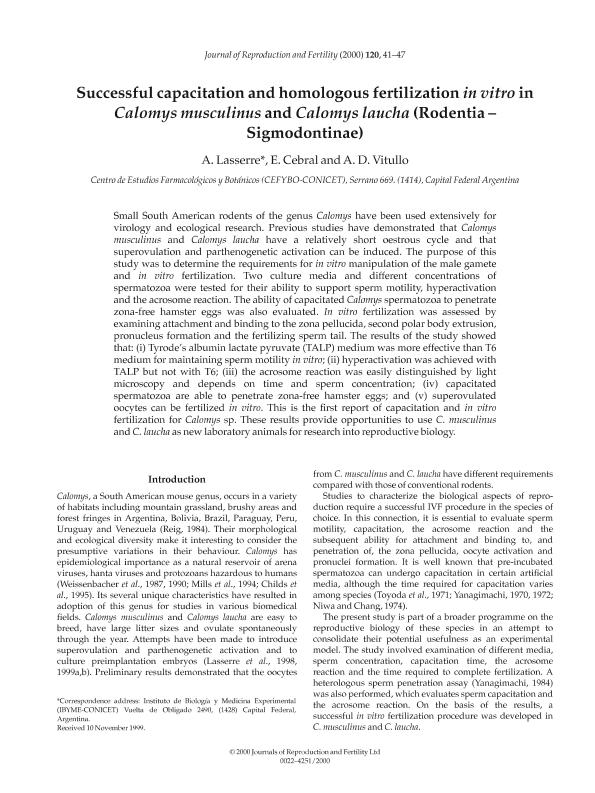Artículo
Successful capacitation and homologous fertilization in vitro in Calomys musculinus and Calomys laucha (Rodentia, Sigmodontinae)
Fecha de publicación:
02/2000
Editorial:
Portland Press
Revista:
Journal Of Reproduction And Fertility
ISSN:
0022-4251
Idioma:
Inglés
Tipo de recurso:
Artículo publicado
Clasificación temática:
Resumen
Small South American rodents of the genus Calomys have been used extensively for virology and ecological research. Previous studies have demonstrated that Calomys musculinus and Calomys laucha have a relatively short oestrous cycle and that superovulation and parthenogenetic activation can be induced. The purpose of this study was to determine the requirements for in vitro manipulation of the male gamete and in vitro fertilization. Two culture media and different concentrations of spermatozoa were tested for their ability to support sperm motility, hyperactivation and the acrosome reaction. The ability of capacitated Calomys spermatozoa to penetrate zona-free hamster eggs was also evaluated. In vitro fertilization was assessed by examining attachment and binding to the zona pellucida, second polar body extrusion, pronucleus formation and the fertilizing sperm tail. The results of the study showed that: (i) Tyrode’s albumin lactate pyruvate (TALP) medium was more effective than T6 medium for maintaining sperm motility in vitro; (ii) hyperactivation was achieved with TALP but not with T6; (iii) the acrosome reaction was easily distinguished by light microscopy and depends on time and sperm concentration; (iv) capacitated spermatozoa are able to penetrate zona-free hamster eggs; and (v) superovulated oocytes can be fertilized in vitro. This is the first report of capacitation and in vitro fertilization for Calomys sp. These results provide opportunities to use C. musculinus and C. laucha as new laboratory animals for research into reproductive biology.
Palabras clave:
Sperm Capacitation
,
Fertilization
,
Calomys
Archivos asociados
Licencia
Identificadores
Colecciones
Articulos(CEFYBO)
Articulos de CENTRO DE ESTUDIOS FARMACOLOGICOS Y BOTANICOS
Articulos de CENTRO DE ESTUDIOS FARMACOLOGICOS Y BOTANICOS
Articulos(IBYME)
Articulos de INST.DE BIOLOGIA Y MEDICINA EXPERIMENTAL (I)
Articulos de INST.DE BIOLOGIA Y MEDICINA EXPERIMENTAL (I)
Articulos(SEDE CENTRAL)
Articulos de SEDE CENTRAL
Articulos de SEDE CENTRAL
Citación
Lasserre, Ana María; Cebral, Elisa; Vitullo, Alfredo Daniel; Successful capacitation and homologous fertilization in vitro in Calomys musculinus and Calomys laucha (Rodentia, Sigmodontinae); Portland Press; Journal Of Reproduction And Fertility; 120; 2-2000; 41-47
Compartir




